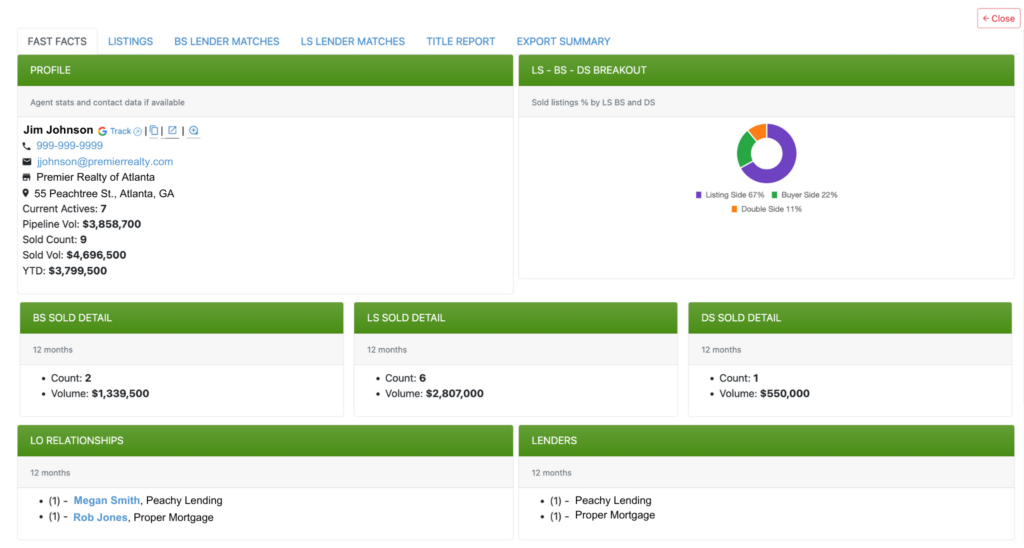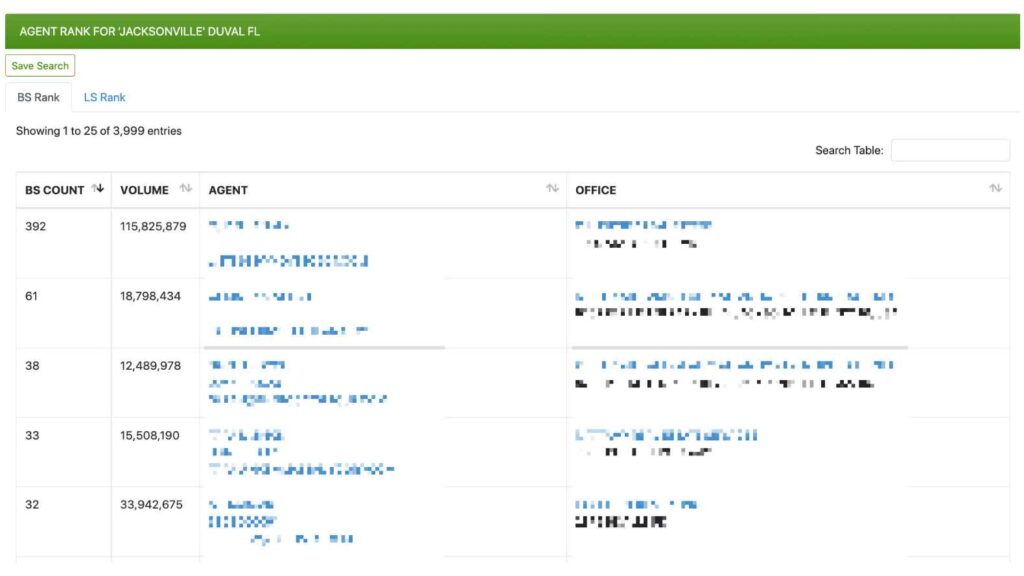Having access to real estate agent data is essential to building and maintaining strong relationships with real estate agents. These partnerships can be a catalyst for business growth, but how do you measure their true value and ensure you’re working with the best partners in the industry?

When you aim to collaborate with top real estate agents, it’s crucial to focus on real estate agent data that help you gauge the value and overall performance of the agents you work with or plan to work with. Conducting research and examining real estate agent data is your key to understanding how much of an agent’s business you’re receiving and identifying opportunities for expansion.
To make informed decisions about your agent network, it’s vital to focus on Real Estate Agent Key Performance Indicators (KPIs). These metrics will guide you in allocating your communication efforts and selecting the agents you want to collaborate with. A reliable source of real estate agent performance data or platform, such as MMI, is essential for this process.
Exceptional real estate agent sales data metrics are indicative of excellent client experiences and you want to align yourself with those who are looking at the bigger picture in driving referrals and repeat business. A great agent can significantly improve your efficiency and boost your bottom line. Moreover, building a robust agent network diversifies your revenue streams, enhancing your overall business sustainability. According to MMI data, loan officers who collaborate with two or more buyside agents during a 12-month period produce an average of 50 transactions, whereas those who work with only one or zero agents average 33 transactions during the same period.
According to MMI data, loan officers who collaborate with two or more buyside agents during a 12-month period produce an average of 50 transactions, whereas those who work with only one or zero agents average 33 transactions during the same period.

Look to leverage a data guidance system like MMI that provides in-depth information on agent production and KPIs.
In addition to data-driven performance metrics, it’s essential to maintain and enhance soft skills such as effective communication and professionalism when working with agents. It’s also important to take a collaborative and dependable approach to foster positive working relationships. Just as in any personal or career-related relationship, it’s critical to develop excellent skills across everything from organization, listening, the art of persuasion and negotiation, and presentation to empathy, confidence, leadership, persistence, and self awareness.
It’s important to have insight into the share of business you’re getting from current Agent Partners, while also identifying good potential new Agent Partners. Data platform tools like MMI provide loan officers with various ways to evaluate real estate agent sales data and performance, both historically and in real-time. This includes insight into data on total and current transactions and real estate agent tracking that includes daily updates on new listings.
Utilize KPIs like volume, values, and average time on market to gauge agent performance. Keep an eye on the frequency of new listings and assess your Wallet Share of their transactions to understand how much of an agent’s business you are truly receiving. You can look for the same metrics for agents you’re not currently working with to establish a solid target list of potential new agents and share of their business you could realistically capture.
There are many tools and platforms available to help you track and evaluate real estate agent performance. Some notable examples include Zillow, EffectiveAgents.com, RealTrends Agent Ranking Data, FrontAgents.com, and the MMI Data Guidance System.
With the right data platform, you can maintain and monitor detailed records of the agents you work with and their performance metrics, including real estate agent sales data. Knowing the number of deals they are closing and the percentage you’re getting is essential. This also holds true for new agents with whom you could potentially work. Look for areas of commonality like types of loans, loan values and geographic areas of focus. Create a prioritized list of new target agents and work on an outreach strategy to establish and foster working relationships to capture part of their business. Our article about how loan officers market to realtors is a great place to expand your knowledge base.
Once you have your agents and data captured and actively being monitored in your data platform, look to push the agent records directly into your Customer Relationship Management (CRM) system like Bonzo to help you manage your top targets for growth and expansion. By tracking communication in your CRM, you ensure that your messaging and subsequent marketing efforts are accurate and on-point. Our post on tools you can use to market to agent partners is a helpful place to begin.

Get insight into agent rankings in specific geographic areas with your mortgage data platform.
Plan ongoing outreach and marketing to Agents in your network and those outside of your network to continually expand your network to include the best performing Agents. Many data platforms also provide extended marketing capabilities by connecting directly to other systems – like MMI’s native integration with Bonzo.
Identify and assess the value of the tools and resources you currently have at your disposal. Are you able to garner key insights into your agent network as it relates to transaction values, volumes, loan types, geographic areas of focus and your share of wallet? Are you able to understand and prioritize new agents with whom you could be working? If not, research other data platforms and tools that will provide you these critical insights that drive your bottom line.
You can use technology rating and ranking websites like G2 and Capterra to help you develop a list of vendors that provide the features and functionality you have identified as most important to help you best measure the value of your agent network. Then engage with these platform vendors for demos of their technology in order to identify the best fit for your organization.
Establish a systematic process to continuously evaluate the performance of real estate agents in and outside of your network. Also look at potential channels of growth by assessing performance and potential value of agents both within your immediate area and beyond. As we’ve discussed there are various tools, including MMI, that can assist in this endeavor. Develop a standard quarterly or annual review of these agent networks so that you regularly evaluate your capture of Wallet Share and other real estate agent sales data. Then identify and prioritize a list of current and new agents with whom you want to expand your relationship. Finally, utilize your CRM and marketing tools to deliver accurate messaging at the appropriate times, utilizing the right soft skills and performance insights, to get their attention – intriguing them to discuss with you new opportunities to work together.
When looking to increase the value of your agent network, be sure to involve your team in the creation of your strategy and also technology evaluation decision-making process. By collaborating early and often with key stakeholders in your organization, your commitment to transparency will foster the trust and support needed in order to help your organization evolve. From there, regular meetings will help you create and deploy an implementation plan that aligns with the goals of the business.
Building, maintaining and growing a thriving agent network is critical to your success in the mortgage lending industry. By understanding and evaluating the value of your agent partners, you can make informed decisions that drive growth and profitability. Utilizing real estate agent data alongside your marketing tools and outreach, you can nurture existing relationships, identify opportunities for expansion, and ensure your network always consists of top-performing agents. As you continue to measure and grow the value of your agent network, you position yourself and your organization for long-term, sustainable success.
To further enhance your understanding of ways to measure the value of your agent network, our webinar on agent tracking is a great resource. Our guidebook on growing your referral partner network is also very popular.
Finally, we welcome you to book a demo of the MMI data guidance system for a deeper dive into all the valuable features and functions that it offers.